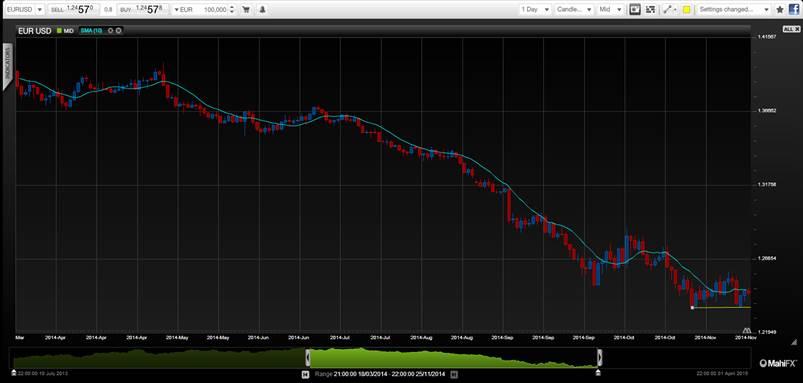The characterisation of Europe as “elderly and haggard” by Pope Francis is an accurate one, but on December 4 the European Central Bank could lay the groundwork to try and revitalise the region's sagging economy.
If was down to European Central Bank President Mario Draghi, the Eurozone would already be on the receiving end of a substantial quantitative easing programme and likely the EUR would be even weaker than it is now – but Draghi's time could yet come, as early as December 4th.
Eurozone inflation levels are well below the 2% target at 0.4%, unemployment is stubbornly high at 11.5% and there are worrying signs of potential stagnation taking hold in the Eurozone's two leading economies – France and Germany. Though there is a welcome stabilisation and even recovery taking place in the region's peripheral economies.
And though QE might be justified on inflation levels (prices are likely to weaken further on falling commodity prices) – Draghi clearly faces tough opposition within the ECB, hence QE hasn't happened yet.
One of those leading opponents is Bundesbank President Jens Weidmann who continues to express scepticism and he has allies, such as Klaas Knot of the Dutch central bank. There are concerns over moral hazard (possibly overdone given the massive fiscal retrenchment in the periphery countries) and the fact that it could be illegal.
Weidmann pointed to rules forbidding the ECB from funding governments by buying sovereign debt. Draghi will likely point to yields of sovereign debt in countries such as Spain as being below 2%, to fiscal discipline (Greece has been running primary budget surpluses) and the fact that these countries do not need the ECB's help to fund themselves. This is about raising inflation.
EUR/USD – poised ahead of Dec 4.
Lack of dramatic results from current stimulus programmes
The fact is the ECB has concocted a virtual alphabet soup of programmes to push cheap money into banks, it's trying to revive Europe's asset backed market and so on … So far none have had had the desired impact and others such as the ABS programme would anyway probably take several years to make an impression. Also, Draghi seems to have agreement that the central bank's balance sheet can expand by EUR 1 trillion.
But buying sovereign government bonds in the secondary markets will have a very quick impact, such as been seen by the QE programmes conducted in the US, UK and Japan. The former two even have growing economies now.
There will be a choreography leading up to the December 4th meeting, which will influence its outcome.
On November 27, Draghi is due to speak in Helsinki and this is another opportunity for him to signal the ECB's intentions with regards QE. A positive statement in favour may be a sign that he is winning the argument within the ECB.
On November 28, Eurozone inflation data is released with it forecast to fall to 0.3% from 0.4% now. A fall would likely bolster the ECB's QE camp – but rise could sway the 'no' side at the meeting.
There's probably a 50/50 chance of a major QE programme being announced on Dec 4. But clearly events are building up for it to happen, so the announcement may come a few months later. The chances of the ECB doing QE in 2015 look increasingly high.
The ECB and BoJ will effectively be replacing the US Federal Reserve and the Bank of England in terms of providing tidal waves of liquidity to the world's capital markets with the fight against deflation very much alive and well. The EUR and JPY look set for more losses over the H1 2015.
Recommended Content
Editors’ Picks
EUR/USD clings to daily gains above 1.0650

EUR/USD gained traction and turned positive on the day above 1.0650. The improvement seen in risk mood following the earlier flight to safety weighs on the US Dollar ahead of the weekend and helps the pair push higher.
GBP/USD recovers toward 1.2450 after UK Retail Sales data

GBP/USD reversed its direction and advanced to the 1.2450 area after touching a fresh multi-month low below 1.2400 in the Asian session. The positive shift seen in risk mood on easing fears over a deepening Iran-Israel conflict supports the pair.
Gold holds steady at around $2,380 following earlier spike

Gold stabilized near $2,380 after spiking above $2,400 with the immediate reaction to reports of Israel striking Iran. Meanwhile, the pullback seen in the US Treasury bond yields helps XAU/USD hold its ground.
Bitcoin Weekly Forecast: BTC post-halving rally could be partially priced in Premium

Bitcoin price shows no signs of directional bias while it holds above $60,000. The fourth BTC halving is partially priced in, according to Deutsche Bank’s research.
Week ahead – US GDP and BoJ decision on top of next week’s agenda

US GDP, core PCE and PMIs the next tests for the Dollar. Investors await BoJ for guidance about next rate hike. EU and UK PMIs, as well as Australian CPIs also on tap.
